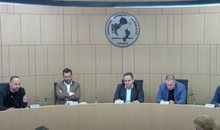
 Flash News
Flash News
International drug search: 36-year-old arrested in Durrës (NAME)
Veliaj's appeal to be heard today in the High Court
Today's hearing at the Fier Court, Salianji requests conditional release
Taxi collides with truck on Lezhë-Shkodër axis, driver taken to Trauma in serious condition
At least 91 dead in Texas floods
The Association of Banks seeks clarity on the timing of expected legal and regulatory changes

The Albanian Association of Banks today asked for more clarity regarding the deadlines of some of the important legal and regulatory innovations in the preparation process.
In his speech during the annual conference of the Bank of Albania, the President of the Association of Banks, Bledar Shella, emphasized the need for a faster step in the necessary steps to be fully ready to integrate into the European Union.
"Now there is no more time. Perhaps a few years ago, we were the ones who asked the authorities for more patience and postponement of the deadlines for the implementation of the standards as long as an imminent EU membership date was not in sight. Today we speak differently. Because we have a defined time horizon - the year 2030. And in this time frame, the banking industry cannot fail to be a contributing, supporting and implementing part of the reforms that await us. Let me emphasize that we live in a time where developments are dynamic and things are constantly changing. Our interest is maximum in how the deadlines for completing the MREL for systemic banks will be handled, when we will have a new law for the central bank and second-tier banks, how the deposit insurance scheme can be changed and when we will be ready for instant payments," he said.
According to him, the banking sector is fully aware that the challenge of integrating the banking industry through the completion and implementation of the legal and regulatory framework of the EU and its institutions requires the involvement of all interested parties.
"Banking activity, which for several years, in fact, has been adapting to regulatory changes in accordance with EU standards, does not come to this empty territory. Now our attitudes and opposition to changes are completely guided by the fact whether these changes are in line with EU standards or not. This has made us experience the burden of the load and responsibility more quickly to go to this process without resistance, but with desire, energy and faith. Although the adaptation of the required legislation is almost determined by EU directives, our role is still indispensable. The new standards must be well understood, there is a need for education and training of the staff who will implement them, but there is also a need for public education to understand them. Starting with PSD2 and SEPA and continuing for others. As AAB, it is up to us to be at the head of this process, treating them with priority according to the agenda," said Mr. Shella.
He pointed out that the banking sector has managed to fulfill the requirements related to open banking, while it has taken great steps forward in the direction of digitization.
"We have just successfully closed Open Banking, all in compliance with PSD2. Now we await the decision to be part of SEPA. Digitalization, implementing strict requirements for cyber security and personal data protection, has included every aspect of banking activity - from onboarding, electronic signature, services, utility payments, payments for public services, account control, exchanges, etc. ., all in one smartphone. Aware that we still have to do for financial inclusion, even though with the law on the basic account, there is already a product to attract more citizens to the bank," said Mr. Shella.
According to him, the figures so far clearly prove that the banking industry is at a very good moment in its development. Only for the 9th month of this year, the banking sector has provided about 281 billion ALL in loans to the economy, an increase of 30% compared to the same period last year. The NPL ratio fell to 4.58%, the lowest level in the last 16 years. Annual growth of deposits 4.1%. 63% of the number of payments are made through electronic channels. Even the total value of payments in these channels has increased to 41%. 34% of active bank accounts are accessible from the Internet.
Mr. Shella emphasized that the role of the banking industry and its contribution to the development of the economy is indisputable.
"We are proud that, after going through the consequences of the crisis of 2008-2010 and those of 2019 and back, such as the earthquake, the pandemic, the war in Ukraine or inflation, the banking industry turned out to be empowered, well-capitalized according to the requirements of the Bank of Albania, with increased lending activity, more public trust in banks, more digitization and more openness to the public. We must strengthen and improve this positive trend during the reform process that unites us with the EU," he said./ Monitor
Latest news


Fire in Dukat endangers Llogara National Park
2025-07-08 10:01:39
International drug search: 36-year-old arrested in Durrës (NAME)
2025-07-08 09:50:48
Thethi, tourists "criticize" modern trend
2025-07-08 09:39:54
Fire on Mount Dukat still active, Llogara National Park at risk
2025-07-08 09:28:12
Veliaj's appeal to be heard today in the High Court
2025-07-08 09:16:02
"Bad sign for democracy"/ Parliament neglects reporting by institutions
2025-07-08 09:04:56
Today's hearing at the Fier Court, Salianji requests conditional release
2025-07-08 08:56:39


Horoscope, what do the stars have in store for you today?
2025-07-08 08:16:19
Weather forecast/ How temperatures will vary throughout the day
2025-07-08 08:02:37
Morning Post/ In 2 lines: What mattered yesterday in Albania
2025-07-08 07:48:30





Marrëdhënia që s’është romancë, por s’është as thjesht kolegiale
2025-07-07 21:39:13
Citizen is asked to pay 2.5 million for a non-existent meter
2025-07-07 21:28:03




What is the ideal air conditioner temperature in summer?
2025-07-07 20:53:46
GJKKO left him in prison, Meta appeals the decision
2025-07-07 20:38:05
Where is Ronaldo after missing Diogo Jota's funeral?
2025-07-07 20:38:04

Messages from the author who killed Ilaria Sulla in Rome are revealed
2025-07-07 20:20:12
At least 91 dead in Texas floods
2025-07-07 20:12:02
Elbasan, choked by smoke, scorched by conscience
2025-07-07 19:48:16

Swarm of bees attacks citizens in France, 24 people end up in hospital
2025-07-07 19:32:03
Dementia/Hearing loss may be a warning sign
2025-07-07 19:13:06
The decision for Malltez, Gjokutaj: Boomerang for SPAK and the Court
2025-07-07 19:01:08

Former Supreme Court member acquitted of asset concealment
2025-07-07 18:36:40

WIIW expert in Politiko: Brain drain is steadily weakening the Albanian economy
2025-07-07 18:11:41
Heart health is at risk from extreme heat, here's what you should be careful of
2025-07-07 18:10:18
Today Gert Bogdani would celebrate, Edlira Çepani's touching dedication
2025-07-07 17:40:45






The striker severely accuses the Fenerbahce club: They tried to drug me
2025-07-07 16:21:03
A decomposed body is found in Kolonjë, initial suspicions
2025-07-07 16:03:31
Accident in Saranda, car hits motorcycle, one injured
2025-07-07 15:58:56

The most fertile age for men and women
2025-07-07 15:40:52
Locals, Rama candidate in 5 municipalities
2025-07-07 15:32:22
Blushi: Meta's criminal kidnapping, incomparable even to Navalny's in Russia
2025-07-07 15:20:34
Meet the iPhone 17 Pro, the main innovations in design and technology
2025-07-07 15:09:09
Why the release of Abi Malltez does not free him; much less Albania
2025-07-07 15:00:12
‘Lidhjet klienteliste’ të mjekëve mbushin recetat e pacientëve
2025-07-07 14:57:33
Poland imposes border controls with Germany and Lithuania
2025-07-07 14:48:15

Caught transporting firearms from Kosovo to Albania, young man arrested (NAME)
2025-07-07 14:37:47
Theo Hernandez flies to Saudi Arabia for medical check-ups
2025-07-07 14:26:47


Scorching heat, Greece orders mandatory work holidays
2025-07-07 13:54:25




Trump expects Netanyahu to discuss Gaza ceasefire
2025-07-07 12:54:27

GJKKO releases Jamarbër Malltezi from house arrest
2025-07-07 12:35:02
Tourism among contrasts
2025-07-07 12:31:01
IKMT action in Theth, starts demolition of unauthorized constructions
2025-07-07 12:24:18

The Tirana-Kamëz line is destroyed by urban fire
2025-07-07 12:00:24




Poor direction!
2025-07-07 11:16:01


Rama to gather the country's mayors on July 9
2025-07-07 10:43:31

Ohrid Natural Park on the way to UNESCO's "black list"
2025-07-07 10:25:58

Registrations for the new school year begin in e-Albania
2025-07-07 09:59:09
KAS decides the "fate" of the elections in four districts of the country today
2025-07-07 09:50:51
Rama does not give up on Vlora, visits the municipality again
2025-07-07 09:39:11


Fires in Gjirokastra, flames very close to cultural monuments
2025-07-07 09:12:49

Foreign exchange, the rate at which foreign currencies are sold and bought
2025-07-07 08:39:57

Horoscope, what do the stars have in store for you today?
2025-07-07 08:14:17
The week starts with scorching temperatures, the thermometer reaches 37°C
2025-07-07 07:58:36
Morning Post/ In 2 lines: What mattered yesterday in Albania
2025-07-07 07:45:15

